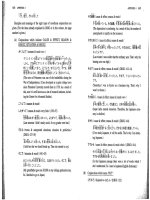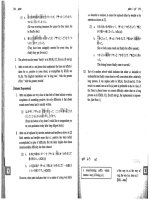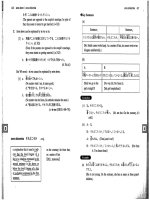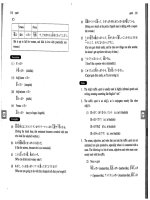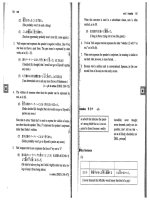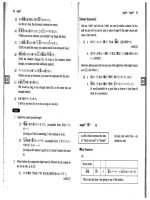TOPIK II INTERMEDIATE LEVEL GRAMMAR
Bạn đang xem bản rút gọn của tài liệu. Xem và tải ngay bản đầy đủ của tài liệu tại đây (973.08 KB, 81 trang )
TOPIK -II
Test of Proficiency in Korean - II
GRAMMAR
INTERMEDIATE LEVEL
By
TOPIK GUIDE
www.topikguide.com
Page |
2
www.topikguide.com
This page intentionally left blank
Page |
3
www.topikguide.com
Copyright © 2014 Satish Chandra Satyarthi
All rights reserved. This book or any portion thereof may not be reproduced or used in any manner whatsoever without the express written permission of
the publisher except for the use of brief quotations in a book review or scholarly journal.
First Published: 2014
TOPIK GUIDE
Seoul, South Korea
www.topikguide.com
Send your feedback to:
Page | 4
www.topikguide.com
TOPIK – II: Intermediate Level Grammar
As you know, the new TOPIK format, Intermediate and Advanced level tests have been combined into one
test, named - TOPIK-II. The test takers will be assigned a level between 4 and 6, based on their score. The
exact passing scores for different levels has not been fixed yet. They will use a system of cut-off mark or
something. The main thing to understand here is that the Intermediate and advanced levels are in one test
now, which means the test paper will have questions of different difficulty levels. Some questions will be
comparatively easier so that Intermediate level aspirants could solve them while some difficult questions will
be aimed at Advanced level aspirants. So, if you are aiming for just level 3 or 4, you don’t need to spend
time on studying advanced level vocabulary and grammar. Instead you can just focus on Intermediate level
study material and try to master them.
That’s the reason why we have kept the Intermediate and Advanced level grammar and vocabulary material
separate despite their being the combined paper. In this eBook we have arranged some important
vocabulary that you need to know in order to clear Intermediate level TOPIK. Though studying the advanced
level vocabulary as well will definitely improve your score, it’s not necessary. But if you are appearing for
TOPIK level 5 or 6, you must study both Intermediate and Advanced level study material.
All the Best!
Page | 5
www.topikguide.com
Grammar
Used
With
Usage
Similar Phrases
Example Sentence
-아/어도
~더라도
Even though; Even if
-다고 해도
-ㄴ/는다고 해도
V/A/N(I)
The fact in first clause doesn’t affect
the fact in second clause.
~(으)ㄹ 지라도
~는 데도
아무리 비싸다고 해도 필요한 책이라면
사야지.
Even if it is expensive, you have to buy the
book if you need it.
~나 마나
-ㄴ/는 다기보다(는)
V/A/N(I)
It is used to indicate that it is better to
say VERB2 rather than VERB1 (rather
than VERB1, VERB2 is a better
reason/option)
예쁘다기보다 작했어요.
I wouldn't say that she was pretty, but rather
good-hearted.
그녀가 시험에 떨어졌다는 소문을 들었어요.
The fact/information/rumor that ….
I heard a rumor that she failed the test.
A-다는 것
V-ㄴ/는다는 것
A/V
Used to make a noun phrase with an
adjective or verb
너의 여자 친구가 예쁘다는 것을 잊어버렸어.
I forgot (the fact that) that your girlfriend was
pretty
Page | 6
www.topikguide.com
If that is the case …..
N-(이)라면
A-다면
V-ㄴ/는다면
-To show a condition or assume
something (hypothetical) that has not
happened yet (assuming different
situation)
날씨가 따뜻해진다면 여행에 갈 수 있습니다,
If the weather gets warm then I can go on a
trip.
V/A/N(I)
-Lower probability of happening than -
학교에 간다면 나에게 알려주세요 If you go to
(으)면
school, let me know
-Often used with 만약
Used to mean that something is “kind
of” in a certain state or to express what
you “feel” about an object/state/action.
-(으)ㄴ/는 감이 있다
영화가 좀 너무 단순한 감이 있어.
This movie is somewhat too simple.
감 (gam) comes from the Chinese
-(으)ㄴ 감이 없지
character (感), which means feeling,
않다
A/V
therefore the phrase is translated like “I
feel that it is …” or “I think it's kind of
…”.
-(으)ㄴ 지
N(Time)이/가
되다/넘다/지나다
Page | 7
V
바가지 쓰는 감이 있지만, 그냥 살래.
I kind of feel that it's a rip-off, but I'll still buy it.
"it's been . . . since . . ."
-(으)ㄴ 지 오래
This pattern is used to indicate that a
time period has lapsed since the action
or event.
되다 been a long
한국에 온 지(가) 10 년 됐어요.
time
=> It's been ten years since I came to Korea.
-(으)ㄴ 지 얼마
www.topikguide.com
안 되다 hasn't
친구를 만난 지 오래 됐어요.
been a long time
=> It's been awhile since I saw my friend.
"just as it is," "(while) doing," "being in
the state of"
-(으)ㄴ 채(로)
V
Used when certain action is taken in
the process of another action (VERB1),
focus is on the resulting state that
-When used with
continues
-아/어 놓다 or -Can use with verbs indicating wearing
아/어두다 the 로
things on your body
-Can use for continuation of emotional is dropped
state
-Incomplete/Complete actions can be
used
-Not used to describe naturally
expected situations
These are noun-modifying endings.
- ㄴ/은/는/ㄹ/을
V/A
=> I got into the bathtub with my glasses on.
문이 열린 채 집에서 아무도 없었습니다.
The door was open and there was nobody at
home.
이거 작년에 부산에 찍은 사진이야.
Adjective +ㄴ/은
좋다 – 좋은 사람 (good person)
Page | 8
안경을 쓴 채 목욕탕에 들어갔다.
This is the photograph I took last year in
Busan.
www.topikguide.com
어머님과 이야기하고 있는 사람이 내
어렵다 – 어려운 질문 (Difficult question)
작은아버지입니다.
Verb + ㄴ/은 (For past tense)
The person talking with my mom is my uncle.
제가 어제 만난 사람 – The person I met yesterday.
Verb + 는 (For present tense)
제가 오늘 만나는 사람 – The person I am meeting today.
Verb + ㄹ/을 (For future tense)
제가 내일 만날 사람 – The person I will meet tomorrow.
-는 with 있다 – 지금 먹고 있는 음식 (The food I am eating
now.)
-은 with 싶다 – 제가 하고 싶은 일 (The work I want to do.)
-(으)ㄴ/는 것 같다
Page | 9
V/A/N(I)
"looks/seems like" "appears that"
-나 보다
이 옷이 비싼 것 같아요.
-(으)ㄴ/는
This cloth seems expensive.
www.topikguide.com
-To guess through a certain fact or
situation
-To express a thought or an opinion
모양이다
그녀가 존을 좋아하는 것 같습니다.
-(으)ㄴ/는 듯하다
It seems she likes John.
Adj. + ㄴ/은 (past) +ㄹ.을 (future)
내일 비가 올 것 같아요.
V + ㄴ/은 (past) +는 (present) +ㄹ/을
It appears like it will rain tomorrow.
(future)
혼자 공부하는 대신 반 친구와 연습하는 것을
좋습니다.
"in place of," "instead of," "but"
N. + 대신(에)
A/V. + ㄴ/은/는
대신(에)
Instead of studying alone I love to study with
my classmate.
V/A/N(I)
대신 literally means "substitution,"
"proxy," or "surrogate," but it also
means "in exchange for" or "as a tradeoff,"
선물로 책 대신 스카프를 샀어.
=> As a gift, I bought a scarf instead of a
book.
날씨가 맑은 대신 추워요.
=> The weather is beautiful, but it's cold.
Page | 10
www.topikguide.com
내 고향이 먼데다가 기차표도 아주 비쌉니다.
-(으)ㄴ/는 데다가
V/A
"in addition to," "not only . . . but also,"
"and also"
-(으)ㄹ
This connective is composed of the -
뿐(만)아니라
는데 connective followed by -다가.
Not only is my hometown far from here the
ticket is also very expensive.
책도 많이 읽는 데다가 운동도 열심히 한다.
=> Not only does she read many books, but
she exercises diligently.
-(으)ㄴ/는 듯이
is like, is as (if) is like, is as (if), looks
like
-(으)ㄴ/는 듯하다
V/A/N(I)
To speculate on the basis of certain
fact or situation.
((-으)ㄴ/는 것
그 사람이 한국인 뜻합니다.
처럼)
He appears like a Korean.
-나 보다
김 씨는 너무 바쁜 닷 해요.
-(으)ㄴ/는 것
Mr. Kim looks as if he is very busy.
같다
-(으)ㄴ 모양이다
Page | 11
www.topikguide.com
Appears like
To speculate something on the basis of
-나 보다
certain fact or situation (shape or
appearance)
-(으)ㄴ/는 것
-(으)ㄴ/는 모양이다
V/A/N(I)
-No guess in VERB1 (If guess you use
-(으)ㄹ 것 같다)
같다
-(으)ㄴ/는 듯하다
문이 닫히는 걸 보니까 집에서 아무도 없는
모양입니다.
After seeing the closed door it seems there is
no one at home.
-Often used with -(으)ㄴ/는 걸 보니까
which is the basis for making the guess
On the one hand…. on the other hand.
-(으)ㄴ/는 반면(에)
V/A/N(I)
It is used when context of VERB1
contrasts with VERB2 (_____ while
_____)
그 사람이 부지런한 반면에 행동이 좀
-지만
-는데 반해
-Express 2 things that are opposite or
one positive and one negative in one
sentence
-(으)ㄴ/는 법이다
Page | 12
V/A
There is reason to expect; it is (or
seems) reasonable that ...; it can be
expected that; it ought (it is supposed)
to be that ...; it is the usual turn of
events that ...; it is nature's law
that ...; the inevitable way of the world
이상합니다.
He is hard working, but on the other hand, his
behavior is little bit strange.
열심히 공부하면 점수가 높아지는 법입니다.
-기 마련이지다
If you study hard it’s obvious that your grades
will improve.
www.topikguide.com
is that; it stands to reason that ..., the
way (law) of the world that ...
V. + ㄴ/은/는 셈이다 - "it is (almost) as
though," "I would say..."
비싸게 산 셈이다.
A.V. + ㄹ/을 셈이다 - "(one) plans to,"
=> (It's almost as though) we paid too much.
"(one) intends to"
-(으)ㄴ/는 셈이다
ㄹ/을 셈이다
-ㄴ/은/는 셈이다 indicates a calculated
V
result and is a colloquial expression. –
ㄹ
나는 오전 중에 돌아 올 셈이었다.
-외/과
마찬가지다
=> I was planning on coming back before
noon.
너 앞으로 어떻게 할 셈이야?
/을 셈이다 indicates an intention or a
=> What are you planning to do from now on?
plan.
-는 셈치다 used to suppose something
that is different from reality (pretend)
Used when information about certain
fact is different from what had been
expected (I thought that. but really.)
-(으)ㄴ/는 줄
알았다/몰랐다
Page | 13
V/A/N(I)
-When used with positive and negative
comments on ability (+/+ and -/- worse
than you expected) (-/+ and +/- better
than expected)
-는다고 생각하다
-(으)려니
여기서 날씨가 이렇게 많이 더운 줄
생각하다
몰랐습니다.
-(으)ㄹ 줄
I had no idea that weather too hot here.
알다/모르다
www.topikguide.com
(used to when
checking
ability/awareness
on how to do
something
-은 척했다
Used to express a fabrication of an
attitude or action that is different from
the fact (act like
V/A/N(I)
-VERB1 contains what is contrary to
reality
-You can't use 알다 in the past
-(으)ㄴ/는 체하다
Page | 14
V/A/N(I)
Used to express the attitude that is
different from the actual action or
condition (acted as though
(Subject acts like
they did
something but
didn't)
모든 사실을 알아도 모르는 척 하지 마십시오.
-는 척했다
Don’t pretend that you are not aware of after
knowing everything.
(Subject acts like
they are in the
process of
something but in
reality not)
여자들이 항상 순결한 체 합니다.
-(으)ㄴ/는 척하다
Girls always pretend that they are innocent.
www.topikguide.com
When a bad result is placed in VERB2
due to VERB1
-(으)ㄴ/는 탓에
V/A/N(I)
In this phrase 탓 roughly means
reason/cause something bad happens
To say that something tends to be
similar to something else (generally so)
-(으)ㄴ/는 편이다
-(으)ㄴ/는데
-(으)ㄴ/는데도
Page | 15
V/A
V/A/N(I)
V/A/N(I)
-Normally adverb in front
-Characteristic/quality needs to be
obvious or objectively verifiable (in
general terms)
-When VERB1 becomes the reason of
VERB2 (since/therefore/and)
-When the VERB2's context contrasts
with VERB1 (but)
-To do something in VERB2 on the
basis of VERB1 (background
information)
-는 탓이다
-는 바람에
어머니께서 안 계신 탓에 집이 이렇게
지저분합니다.
-는 통에
The house so dirty because my mother is not
there.
-Negative forms
이 물건이 저 보다 싼 편이어서 사십시오.
안 -는 편이다, -
This one is cheaper than that so buy this.
는 편이 아니다
배고픈데 피자 시켜먹자
I'm hungry. Why don't we order pizza?
When something that is different from a -With 불구하고 to 계속 잤어는데도 감기가 낫지 않아요
generally expected result in VERB1's
make situation is placed in VERB2
(으)ㄴ/는데도
-Can't use future tense, imperative, or
Even though i keep sleeping the cold is not
불구하고 to
suggestive ending
getting better.
further
www.topikguide.com
emphasize the
contrast or
unexpectedness
"to know if/whether"
"not to know if/whether"
-(으)ㄴ/는/(으)ㄹ지
알다/모르다
V/A/N(I)
알다 and 모르다 verbs use -지 to mean
어떤 선물이 좋은지 알아요?
"how to" or "if/whether," as illustrated in
the examples below. When a question
Don't you know which gift is appropriate?
pronoun, such as 언제, 어디, 왜, 누가,
친구가 언제 올지 모르겠어요.
어떤, 무슨 or 무엇, precedes this
I don’t know when my friend will come.
construction, the speaker is inquiring
when, where, why, who, which, what
kind, or what, respectively.
가나 마나 우리는 늦어서 그 영화는 못 봐.
"no use," "no point doing," "not
worth doing"
-(으)나 마나
Page | 16
V
This pattern indicates a futile attempt
or uselessness, meaning literally
"whether to do it or not."
-아/어 봤자
=> There is no use going; we can't see the
movie because we're late.
그 약은 먹으나 마나였다.
=> The medicine was no use. It didn't help.
www.topikguide.com
-았/었어야
-(으)ㄹ 걸 (그랬다)
V
"should
have . . ."
했는데 (Should
This short form of -ㄹ/을 것을 그랬다
-지 말걸
indicates mild regret, as in "I should
have done.
그랬다/안 -(으)ㄹ
have done)
걸 그랬다
점심을 미리 먹을 걸 그랬다.
=> I should have eaten lunch earlier.
떡국을 끓일 걸 그랬다.
=> I should have cooked (boiled) the ricecake soup.
(Should not have
done)
“To do Verb2 and not Verb1”
"it is not (the fact) that," "not . . .
but . . ."
-(으)ㄴ/는/(으)ㄹ 게
아니라
-(으)ㄹ 겸
-지 말고
친절해요.
(으)ㄴ/는/(으)ㄹ
=> Not only is the weather nice here, but the
people are also nice.
This expression amends the action,
event, or item in the first part of the
sentence by the second part.
것이 아니라
로스앤젤레스가 아니라 시애틀에 도착했어요.
"while doing . . .
-는 김에(means
This construction indicates that the
second action has a dual purpose.
Taking advantage of the situation, you
do one thing while doing something
else at the same time.
doing actions
together)
선생님도 뵐 겸 학교에 갔다.
-가는 길에/오는
I went to school and at the same time visited
my teacher.
V
V
여기는 날씨만 좋은 게 아니라 사람들도
=> He arrived in Seattle, not Los Angeles.
길엥 (on the way
to/from you do
Page | 17
www.topikguide.com
something)
친구도 사귈 겸 한국 학생회에 나갔다.
-겸 (used with
=> I went to attend the Korean students'
meeting and also to make friends (there).
noun)
There’s no way, Can’t be
그가 이렇게 빨리 올 리가 없다.
-(으)ㄹ 리(가) 없다
V/A
Expresses a doubt in the possibility or
the likeliness of an action or a
-절대로 -지 않을
He can’t be here that early.
state. 리 means a reason, a possibility,
것이다
내 여자친구가 날 찰 리가 없다.
or a cause. This grammar structure is
usually used in the present tense and
the past tense, and even when it's
referring to a future action, the
sentence remains in the present
tense.
-(으)ㄹ 리(가)
My girlfriend can’t be dump me.
있어요?
그가 저녁을 먹었을 리가 없다.
"it is worth doing," "it is doable," "to be
deserving"
-(으)ㄹ 만하다
V
-To recommend something since the
speaker considers it to be worthy.
He can't have had dinner.
그 소설은 읽을 만해.
=> The fiction is worth reading.
요즘 볼 만한 영화가 뭐 있을까?
=> Which movies are worth watching
nowadays?
Page | 18
www.topikguide.com
그 학생은 상을 받을 만 하다.
=> The student deserves an award.
"almost," "nearly," "a close call"
It is used to mean that something
almost happened (but did not actually
happen) (almost <V attached>)
-(으)ㄹ 뻔하다
V
. 교차로에서 사고가 날 뻔했다.
=> I nearly had an accident at the
crossroads.
-Most cases speaker is relieved it didn't
happen
-Always use in past
-Often used following constructions
that indicate hypothetical past
차 사고가 나서 하마터면 죽을 뻔했다.
=> I almost died because of the car accident.
situations (-았/었더라)
- When used with 하마터면, this
construction intensifies the near
occurrence of an event that could have
happened.
“Not only.. but also….”
-(으)ㄹ 뿐(만) 아니라
Page | 19
V/A/N(I)
To add a piece of information from
VERB2 to VERB1 (but also)
-(으)ㄴ/는 데다가
그는 가난할 뿐만 아니라 몸도 허약하다.
www.topikguide.com
He is not only poor but also sickly.
-Clauses should be +/+ or -/- can't mix
-These often follow (A/V-기까지 하다/
A/V-기도 하다/ N-까지 A/V)
“It’s only that…, Not more than ….,
just…”
-(으)ㄹ 뿐이다
V/A/N(I)
To show that there is nothing else than
what is mentioned in VERB1 (that's all,
all I did, only)
-Only one course of action
-In this form 뿐=오직 meaning solely,
-(으)ㄹ 뿐
-More emphatic
use (N-만 -(으)ㄹ
난 그냥 좀 바쁠 뿐인데요.
It's just that I'm a little busy.
뿐이다/ A/V-기만
지금 많이 배고파요. 밥을 먹고 싶을 뿐이다.
-(으)ㄹ 뿐이다)
I am so hungry now. I just want to eat.
merely, only
"there is no way/choice but to . . . ,"
"have to"
-(으)ㄹ 수 밖에 없다
Page | 20
A/V
It is used in situations in which there is
no other choice for the subject but to
do VERB1's action (in case of verb) or
to be in VERB1's stat (in case of
adjective)
할 게 너무 많아서 밤을 새울 수밖에
없겠어요.
=> There is so much to do, I have no choice
but to stay up all night.
싫지만 치과에 가는 수밖에 없다.
=> I hate it, but there's no way but to go to a
dentist.
www.topikguide.com
눈물이 날 정도로 아팠어.
"(so) . . . to the extent that," "(so) . . .
to the point that"
-(으)ㄹ 정도로
V/A
This pattern expresses a hypothetical
or real degree, limit, or extent of the
performance, action, or behavior. –
Sometimes Used to exaggerate
It's was so painful that I almost cried.
-(으)ㄹ 정도이다
-(으)ㄹ 만큼
-(으)ㄹ 지경이다
숨을 쉬지도 못 할 정도로 많이 먹었다.
=> I ate so much (to the extent) that I can't
breathe.
시험이 너무 어려워 울 지경이었다.
"to/at the point of . . . ," "almost,"
"nearly"
=> The exam was so difficult that I almost
cried.
This expression is often preceded by a
-(으)ㄹ 지경이다
V
verb of hardship, such as 포기하다,
-(으)ㄹ 정도이다
피곤해서 쓰러질 지경이다.
=> I am so tired that I'm about to collapse.
쓰러지다, 죽다, 울다, 꺾어지다, or 넘어
목이 말라서 죽을 지경이었다.
지다.
=> I almost died of thirst.
V. + ㄹ/을 테니(까) means
-(으)ㄹ 테니(까)
Page | 21
V/A/N(I)
"since/because (it is expected to)." It
indicates the speaker's expectation in
regard to an event or an action. This
construction comes from the
Combination of (으)ㄹ 터이다
(Express
speaker's
intention) and -
내가 도와 줄 테니까 걱정하지 마세요.
I will help you, so don't worry.
www.topikguide.com
connective (으)니까 "because"
(으)니까
날씨가 추울 테니까 두꺼운 옷을 입고
attached to the ㄹ/을 터이다 "is
(express reason)
나가세요.
expected" ending.
-VERB1 shows the speaker's will and
becomes the condition for VERB2
-Generally used with command or
suggestions.
-Subject should be speaker in VERB1
-VERB1= reason for suggestion or
advice
-VERB2=suggestion or advice
=> The weather will be cold, so go out with
thick (warm) clothes on.
버스 타면 늦을 테니까 지하철을 타자.
=> We'll be late if we take a bus, so let's go by
subway.
"I imagine," "I would think," "it must be"
이 책은 초등 학생에게는 어려울 텐데 다른
This short connective form of -을/일
책을 사는 게 어때요?
터인데 indicates the speaker's
expectation or anticipation. It is derived
-(으)ㄹ 텐데
V/A/N(I)
from the verb 터이다 "to expect" and
the connective -ㄴ/는데.
When the preceding phrase shows a
speaker's speculation and it works as a
basis of the succeeding phrase
Page | 22
This book is probably difficult for an
elementary school student so how about
buying a different book?
오늘이 동생 생일일 텐데 케이크를 먹었는지
모르겠다.
=> Today must be my younger sibling's
www.topikguide.com
birthday, but I don't know whether he/she had
a cake.
“contrary to what you might
expect or think.., Probably...”
-(으)ㄹ걸(요)
V/A/N(I)
그 사람이 드라마 배우 일걸요.
-(으)ㄹ 거야
-To speculate (need knowledge to back
-(으)ㄹ 거예요
up speculation) about certain fact
(means a
- Conversation only, intention raises at speculation)
end
-Used in spoken language
“for fear lest ... ; for fear
that ... ; (afraid/concerned) that ...”
He’s probably a drama star.
아마 일을 끝냈을 걸요.
I think he might have finished the work
already.
시험이 어려울까 봐 공부를 열심히 했어요.
-To do VERB2 in advance because the
speaker is worried about VERB1 (봐
-(으)ㄹ까 봐(서)
V/A/N(I)
here used as to guess/think)
*This is different-(으)ㄹ까 보다/(으)ㄹ까 싶다/-(으)ㄹ까 하다/-(으)ㄹ
지도 모르다 comes at the end of
sentence and shows an uncertain plan
Page | 23
-(으)ㄹ까
싶어(서)
-(으)ㄹ 지도
몰라(서)
I feared the test would be difficult, so I studied
hard.
교수님이 화날까 봐
비가 올까 봐서 우산을 가지고 왔어요.
I brought an umbrella in case it rains.
www.topikguide.com
다음 달부터 요가를 배울까 해요
“To intend to …., to think of doing…”
-(으)ㄹ까 하다
V
-Used to describe the speaker's vague
intention or plan that can easily be
changed (I might _____)
-(으)ㄹ까 보다
I'm thinking of learning yoga starting next
month.
그 노인은 죽을락 말락 한다.
to come close to, to be on the brink of.
The old man comes close to dying
(ㄹ 뻔하다)
-(으)ㄹ락 말락 하다
V
그녀는 그를 때릴락 말락 했다.
-Used to say that something almost
happened but didn't at the end (I nearly
<V attached> but (reason why not))
She was on the verge of hitting him
비가 올지도 몰라요.
“It might/may…”
-(으)ㄹ지도 모르다
V/A/N(I)
-Used to indicate the speaker's view
that something might happen or could
possibly (but unlikely) occur
-Used as a guess so rude to use about
an important event that someone is
worried about
It might rain.
-(으)ㄹ지 모르다
시험에 떨어질지도 몰라.
It might fail the exam.
우리 수진이는 조금 늦게 자서 배고팠을지도
몰라요.
Page | 24
www.topikguide.com
Sujin slept late so I didn’t know if he’d have
been hungry.
“Intend to/Plan to/Going to”
다음 달에 카메라를 사려고 해요.
-Used to explain future plans (more
-(으)려고 하다
V
concrete than -(으)ㄹ까 하다)
-Indicates the speaker's intention
-Can use for future plans
-(으)려던 참이다
I plan to buy a camera next month.
“I am/was about to do....”
-(으)려던
-Used to express a plan for the
foreseeable future (indicates speaker's
intention), speaker was just about to do
what is suggested
참이었다-even
-These often appear at the beginning
마침/그렇지 않아도/안 그래도
안 그래도 전화하려던 참이었어.
before the
suggestion (I had => I was just about to call you anyway.
planned to
that> and was
just about to)
그 사람은 사고로 인해 목숨을 잃었어요.
-(으)로 인해(서)
N
“Because of… , Due to…, On account
of…”
When VERB2's result comes because
of VERB1 (Due to <N attached> _____
happened)
Page | 25
That person died from (due to) a car accident
저는 야외모임을 비로 인해 취소했어요.
I cancelled the meeting outside due to the rain
www.topikguide.com


